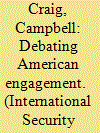| Srl | Item |
| 1 |
ID:
124382


|
|
|
|
|
| Publication |
2013.
|
| Summary/Abstract |
In making their case for maintaining the United States' policy of "deep engagement," Stephen Brooks, John Ikenberry, and William Wohlforth stress that the U.S. security commitment to states in Europe, the Middle East, and East Asia, together with the formidable specter of American preponderance, stifles regional rivalries and hinders the resurgence of a dangerous era of multipolar power politics. The authors contend that a policy of U.S. retrenchment could spark the "return of insecurity and conflict among Eurasian powers," whereas a continuing policy of deep engagement, by "supplying reassurance, deterrence, and active management … lowers security competition in the world's key regions, thereby preventing the emergence of a hothouse atmosphere for growing new military capabilities." In short, they suggest, deep engagement reduces the chances of a major Eurasian war; a new strategy of retrenchment would increase them.
|
|
|
|
|
|
|
|
|
|
|
|
|
|
|
|
| 2 |
ID:
103841


|
|
|
|
|
| Publication |
2009.
|
| Summary/Abstract |
This article examines the reassessment of U.S. strategy that Dwight D. Eisenhower directed after replacing Harry S. Truman in the White House in January 1953, as he worked to bring the Korean War to an end and then confronted the problems remaining in its aftermath. Despite much of the rhetoric of the early Eisenhower administration, the outcome of that reassessment fit more closely the objective of containment than key strategic formulations of its predecessor. Why was this so? How did the orientation apply to ending the war in Korea and sustaining the U.S. position there and elsewhere after the armistice? What insights, if any, do the process of reassessment and its outcome provide for the present? Answers to these questions serve to emphasize the dynamic and contingent nature of American strategy in the early Cold War and the importance of flexible, engaged leadership in the White House.
|
|
|
|
|
|
|
|
|
|
|
|
|
|
|
|